How CDS Providers Assist with Home Organization and Cleaning
Empowering Independence through Managed Home Care Services

Understanding the Role of CDS in Day-to-Day Home Management
Consumer Directed Services (CDS) represent a vital component of home healthcare, offering individuals with disabilities and elderly populations a flexible, personalized approach to maintaining their living environments. By enabling clients to direct their own care, CDS fosters independence, enhances quality of life, and promotes a sense of control over daily routines, including home organization and cleaning. This article delves into how CDS providers assist with these essential tasks, the scope of services offered, regulatory considerations, and the broader impact on home care efficiency.
What Is a Consumer Directed Service (CDS) in Home Care?
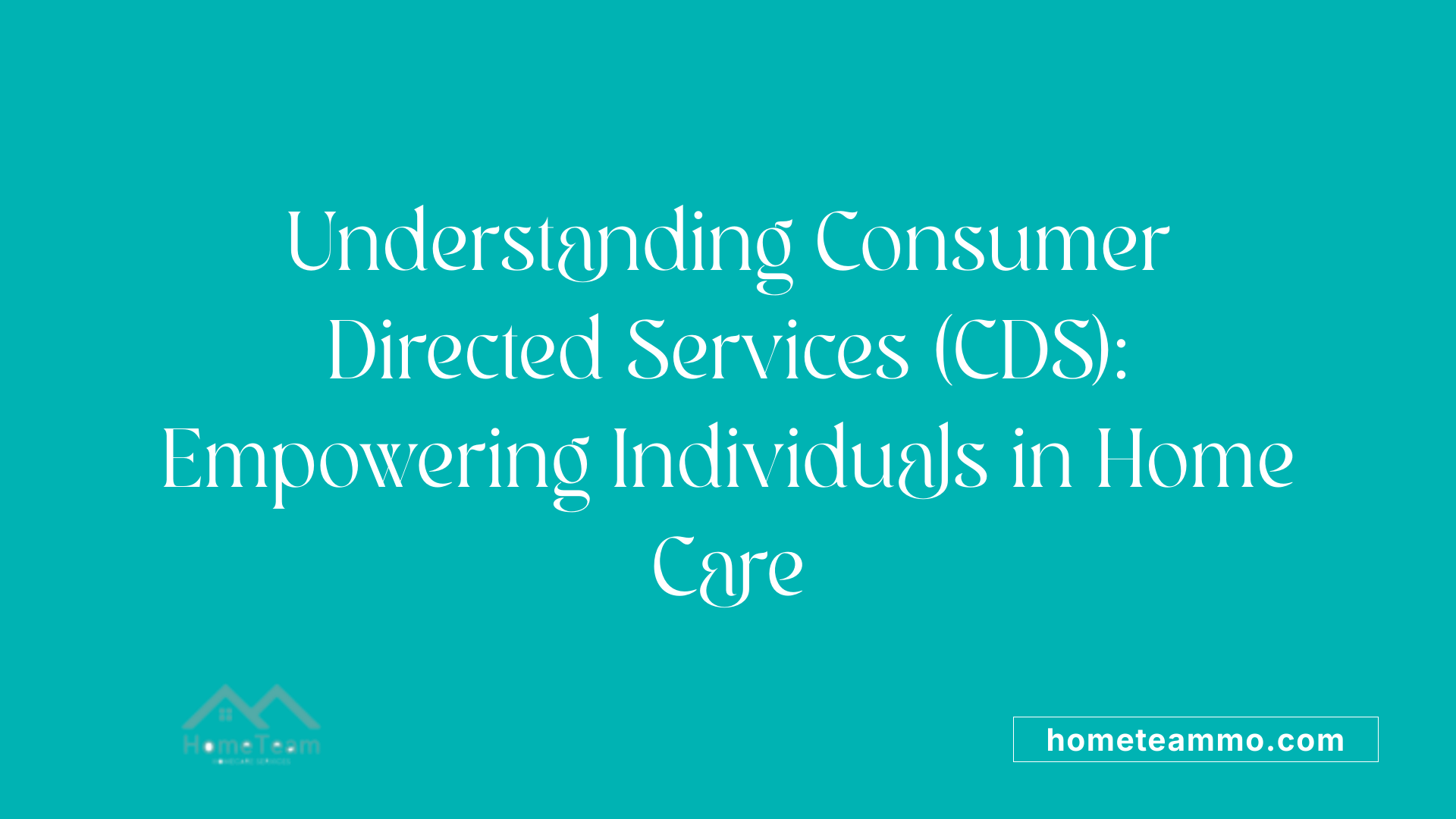
What is a Consumer Directed Service (CDS) in home care?
Consumer Directed Services (CDS) are a form of Medicaid-supported home healthcare that allows individuals to take control of their own care. Through CDS, consumers—who are often Medicaid recipients—can hire, supervise, and manage their own care providers, including family members, friends, or community caregivers. This personalized approach helps ensure that care plans are tailored to the specific needs and preferences of each person.
CDS is available in many states, including over 40, and is part of broader Medicaid programs such as STAR Kids, STAR+PLUS, and STAR Health. It supports older adults and individuals with disabilities who wish to remain in their homes while managing their health and daily activities.
How does CDS give control to consumers?
With CDS, members become employers of their caregivers. They can choose who to hire, set their schedules, determine duties, and decide how much to pay. Members work with contracted Financial Management Services Agencies (FMSAs), which provide support with budgeting, payroll, and compliance, making it easier to manage care responsibilities.
This setup fosters greater trust and communication because individuals can select caregivers they are comfortable with—improving overall satisfaction with care and health outcomes. Additionally, having control over care choices reduces reliance on institutional care and can lower costs by utilizing family or community caregivers.
What services are included in CDS?
CDS covers a wide range of services, from everyday household support to health management. These include:
- Personal Care: assistance with toileting, bathing, and grooming.
- Housekeeping: cleaning, dusting, laundry, and trash removal.
- Meal preparation and feeding.
- Transportation to appointments or community activities.
- Health support services, such as medication reminders.
These services are designed to support comprehensive home management, helping individuals live independently and comfortably.
Why is CDS becoming more popular?
The growth of CDS programs reflects their success in empowering patients and families, improving care quality, and reducing healthcare costs. Many see it as a way to enhance client satisfaction and engagement through personalized care planning. Moreover, by allowing families to be actively involved, CDS helps reduce caregiver stress and burnout.
Technology plays a crucial role in the expansion of CDS. Platforms like CareVoyant facilitate care coordination, documentation, and compliance, streamlining the management of these programs. As awareness of CDS grows and technology improves, more states are adopting this flexible and patient-centered model of home care.
| Aspect | Details | Additional Notes |
|---|---|---|
| Program Scope | Medicaid programs like STAR and others | Over 40 states offer CDS options |
| Primary Resources | FMSA, online support, videos | Support members through education |
| Services Covered | Personal care, housekeeping, meals, transportation | Wide range of home support activities |
| Benefits | Increased autonomy, personalized care plan, cost savings | Reduces institutional care reliance |
| Challenges | Management complexity, regulatory compliance | Supported by specialized care management software |
How Do CDS Providers Assist with Home Organization and Cleaning?
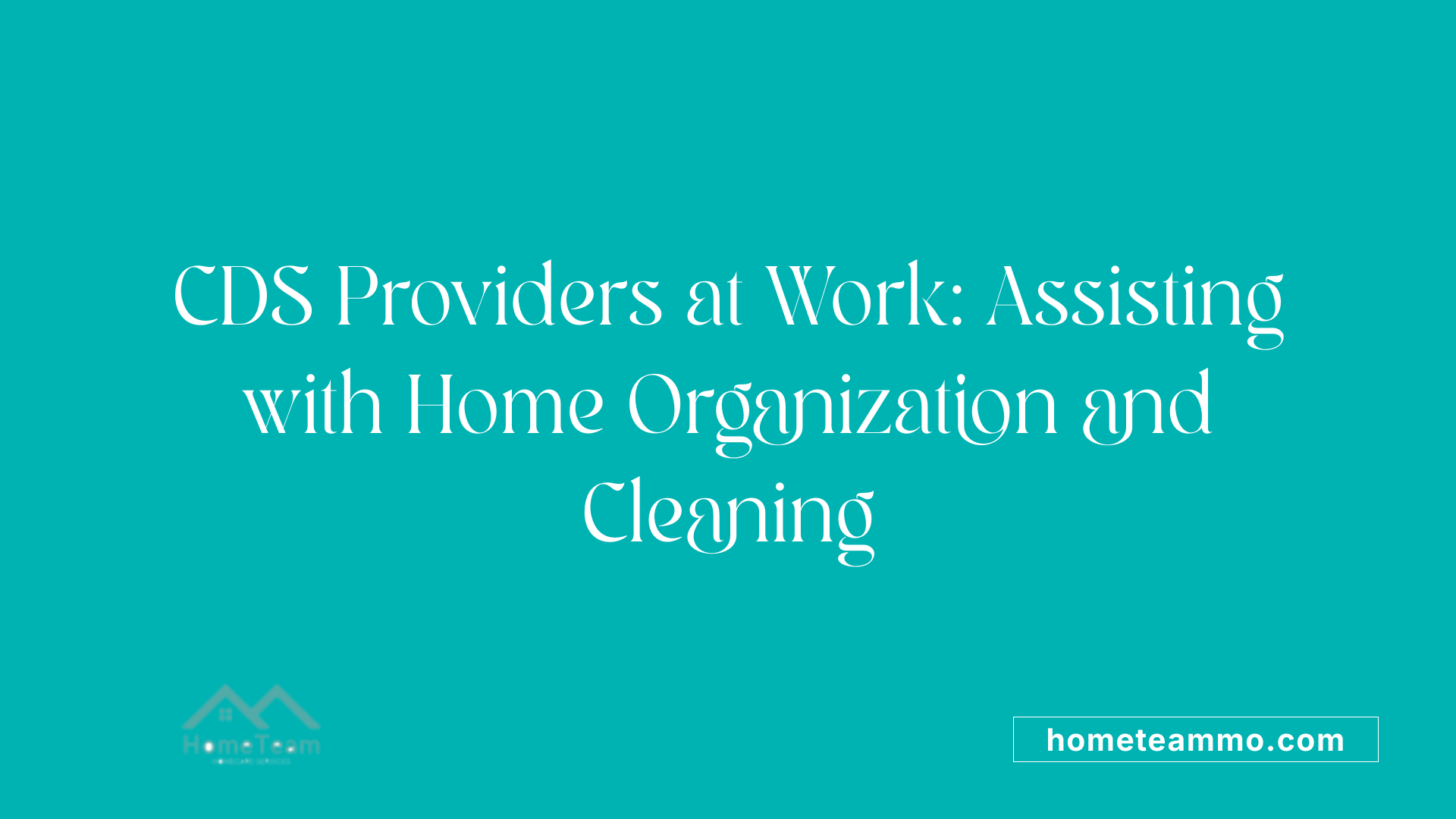
How do CDS providers assist with home organization and cleaning?
CDS providers help with home organization and cleaning mainly by allowing individuals with disabilities to hire personal care attendants. These attendants can assist with a variety of household chores, including cleaning, laundry, dusting, and trash removal.
Through the CDS program, members have the authority to choose and supervise their caregivers, which can include friends, family members, or hired staff. This control ensures that the support provided is tailored to their specific needs for maintaining a clean and organized living environment.
Supporting independence is a central goal of CDS. By managing their own service providers, members can develop personalized routines and home management plans. This customization helps create a comfortable and safe living space.
Attendants may also help with tasks like making beds, organizing clutter, or running errands related to household upkeep. With proper training and support from contracted agencies, these caregivers can perform a comprehensive range of housekeeping services.
Overall, CDS fosters a personalized approach to home care, focusing on the individual's preferences and needs. This empowers clients to maintain their homes effectively, promoting independence and improved quality of life.
Supporting Home Environment Maintenance for Individuals with Disabilities and the Elderly
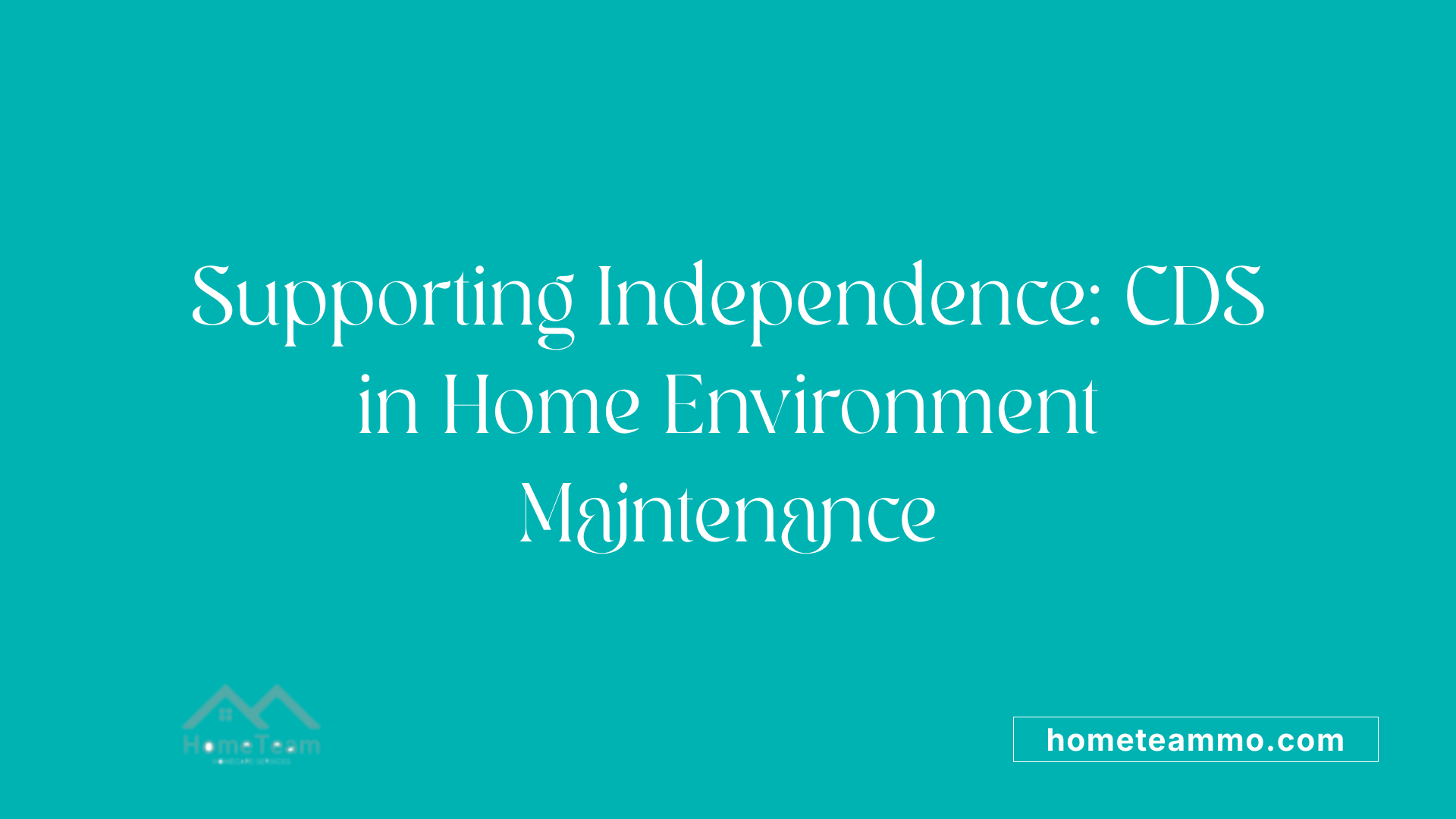
What role do CDS providers play in supporting individuals with disabilities and elderly in maintaining their living environments?
Consumer Directed Services (CDS) providers are vital in helping individuals with disabilities and seniors sustain a safe and comfortable living space. They offer a variety of support services that are tailored to meet each person's unique needs. These include assistance with housekeeping tasks such as cleaning, dusting, laundry, and trash removal, which keep the home organized and hygienic.
CDS providers can also help with personal care, including grooming and toileting, and support with meal preparation and transportation. This comprehensive approach ensures that individuals can manage daily activities effectively while remaining in their homes. Moreover, many programs, like Consumer-Directed Personal Assistance Services (CD-PAS), allow beneficiaries to hire and supervise caregivers of their choice, fostering a personal connection and trustworthy relationship.
Strategies used by intermediaries
Support often comes through Intermediary Service Organizations (ISOs) or Financial Management Services Agencies (FMSA). These agencies assist members with administrative tasks such as budgeting, payroll, and provider training, relieving the burden from individuals and families.
They also facilitate orientation and ongoing training for caregivers, ensuring quality and compliance with statutory regulations. This support structure empowers users to manage their services confidently and adapt as their needs evolve.
Importance of personalized support in home management
Personalized support through CDS makes a significant difference in maintaining independence. It allows individuals to choose providers who understand their specific routines and preferences, promoting better communication and trust.
This tailored approach not only enhances safety and health outcomes but also reduces stress for both caregivers and recipients. For seniors and people with complex medical needs, personalized home management encourages a sense of control and dignity.
In summary, CDS providers play an essential role by offering flexible, customized support that sustains individuals’ ability to live comfortably and safely in their own homes, enriching their quality of life.
Enhancing Independence and Care Efficiency with CDS Services
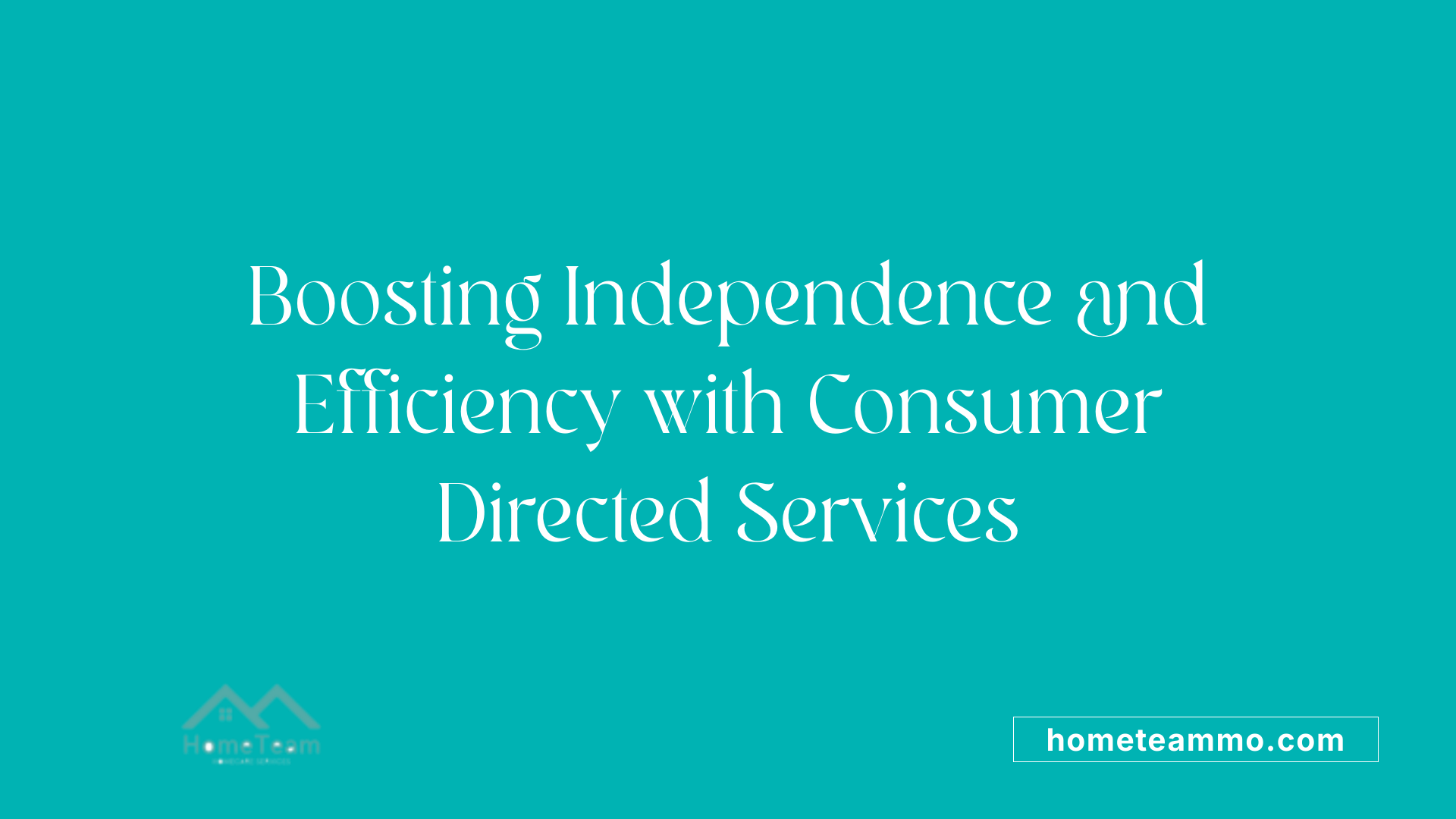
What are the benefits of CDS services for independence and efficiency in home care?
Consumer Directed Services (CDS) significantly boost the independence of individuals receiving care by giving them control over their healthcare decisions. Members can hire their own caregivers, set flexible schedules, and decide on the specific duties that their care providers will perform. This approach encourages active participation in managing their own care, resulting in greater autonomy and comfort.
On the efficiency side, CDS simplifies administrative tasks involved in home care. Automated processes such as scheduling, payroll management, and documentation reduce the time and effort typically spent on paperwork and coordination. Members often work with contracted Financial Management Services Agencies (FMSA) that handle these administrative responsibilities, freeing up time for both caregivers and patients.
Furthermore, CDS leverages technology tools like electronic health records (EHR) and management software. These tools facilitate real-time communication, enable timely updates to care plans, and improve overall coordination among providers and family members. Such integration ensures that care remains personalized and adaptable to changing health needs.
Sharing decision-making responsibilities with familiar caregivers fosters trust and reduces anxiety, especially for elderly patients. This familiar environment supports better emotional well-being and encourages active participation in ongoing health management.
In summary, CDS services promote independence by empowering members to take charge of their care and enhance efficiency through streamlined administrative processes and supportive technology. These combined benefits lead to improved health outcomes, better resource management, and a more tailored, responsive home care experience.
Regulatory and Safety Considerations in Home Cleaning Services
What regulatory considerations exist for CDS-related home cleaning and organization services?
Currently, there are no specific regulations exclusively governing cleaning and organization services for CDS participants. Unlike clinical healthcare, these services are generally not subject to detailed regulations.
However, when cleaning involves handling hazardous substances, sterilization, or environmental hygiene measures similar to healthcare environments, certain rules may apply. These could include local, state, or federal standards designed to protect health and safety.
For instance, cleaning products used must often be approved for safety and environmental impact. Staff should be trained properly on the use of these products to prevent accidents or health issues.
While formal regulations are limited, best practices borrowed from healthcare standards can be valuable. Guidelines such as the United States Pharmacopeia (USP) chapter 797, which covers sterile compounding, may influence cleaning routines to ensure cleanliness and safety even outside clinical settings.
Overall, caregivers and agencies involved in CDS cleaning services should prioritize general health and safety compliance. This includes following environmental standards, using approved cleaning agents, and ensuring staff are trained in safe handling procedures.
How do health and safety standards impact these services?
Health and safety standards serve as a framework to prevent infections, accidents, and environmental hazards. These standards are crucial for protecting both service recipients and providers.
For example, appropriate cleaning techniques, disinfectant use, and waste disposal help minimize risks.
Agencies should implement policies aligned with recognized safety protocols to ensure safe home environments. This not only protects health but also builds trust with CDS participants.
What are best practices and how can compliance be ensured?
Best practices include meticulous staff training, regular review of cleaning procedures, and adherence to environmental hygiene standards.
Service providers should keep updated on evolving guidelines from health authorities like the CDC or OSHA.
Employing protocols that include proper use of PPE, correct chemical handling, and environmental cleaning methods help guarantee safety.
To ensure compliance, agencies can conduct routine audits, maintain thorough documentation, and participate in continuous education programs.
By maintaining a strong focus on safety and regulation, CDS-related cleaning services can provide effective, safe, and trustworthy support to participants requiring home management assistance.
The Future of CDS in Home Care: Challenges and Opportunities
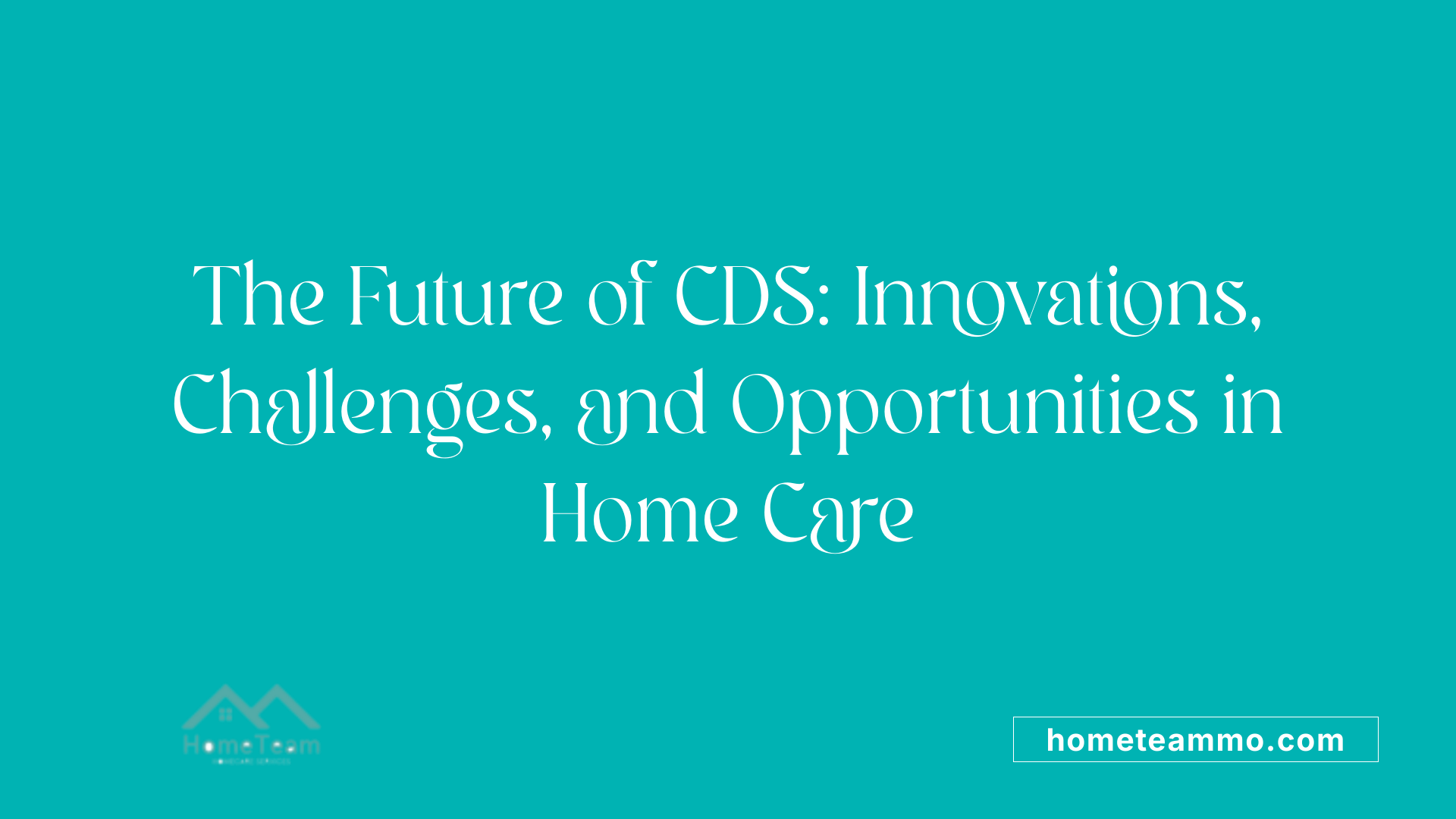
How might technological advancements shape the future of Consumer Directed Services?
Emerging technologies such as telehealth, remote monitoring devices, and mobile management apps are transforming how consumers manage their care. These tools enable members and caregivers to coordinate more efficiently, monitor health conditions in real-time, and access resources instantly. Adoption of secure digital platforms simplifies administrative tasks, like scheduling and payments, making CDS more user-friendly.
What regulatory developments could impact CDS programs?
As CDS expands, regulatory frameworks are expected to evolve to ensure safety, privacy, and quality standards. New laws might clarify provider requirements, reimbursement procedures, and oversight protocols. Additionally, regulations could adapt to incorporate innovative service models and ensure equitable access for diverse populations, including underserved communities.
How is the scope of services in CDS expected to grow?
Initially focused on personal care and housekeeping, the range of CDS offerings is likely to broaden, incorporating services like medication management, specialized therapies, and community integration activities. This expansion will allow members to customize their support further and address comprehensive health and wellness needs.
Summarizing the outlook for CDS, various factors such as technological progress, regulatory adjustments, and service diversification will play pivotal roles in enhancing how consumers receive and manage home care. These developments will aim to improve quality of life, empower patients, and ensure sustainability of programs amidst evolving healthcare environments.
Implementing Best Practices: Ensuring Quality and Compliance in Home Cleaning and Organization
How can training and certifications improve home cleaning and organization in CDS?
Proper training and certifications are essential components of quality care under Consumer Directed Services (CDS). Caregivers involved in housekeeping and home organization should undergo specific training that covers proper cleaning techniques, infection control, and safe handling of cleaning supplies. Certifications from recognized organizations verify that caregivers possess the necessary skills and knowledge, helping to ensure homes are cleaned safely and effectively.
What are the best practices for safety in CDS housekeeping services?
Safety is paramount when providing home cleaning and organization services. Best practices include using non-toxic, environmentally friendly cleaning products, wearing appropriate protective gear, and following proper procedures for handling hazardous materials. Regularly assessing the home environment for safety hazards, such as loose rugs or clutter, can help prevent accidents. Additionally, caregivers should be trained to identify and address potential safety issues proactively.
How can monitoring and evaluation ensure high-quality home services?
Ongoing monitoring and evaluation are critical to maintaining high standards in CDS housekeeping and organization. This can involve periodic home visits by supervisors or FMSA representatives to assess service quality and safety compliance. Feedback from members about their satisfaction and any issues should be actively solicited and addressed. Implementing routine review processes ensures that services adapt to changing needs and that caregivers adhere to safety and quality standards.
| Aspect | Practice | Purpose |
|---|---|---|
| Training & Certifications | Specialized caregiver training, recognized certification programs | Ensures skills, safety, and adherence to standards |
| Safety Protocols | Use of eco-friendly products, hazard assessments | Protects both caregivers and residents |
| Monitoring & Evaluation | Regular home inspections, feedback collection | Maintains service quality and complies with regulations |
These practices support quality, safety, and compliance, helping members enjoy cleaner, safer living environments tailored to their health needs.
Summary: The Impact of CDS on Home Organization and Cleaning
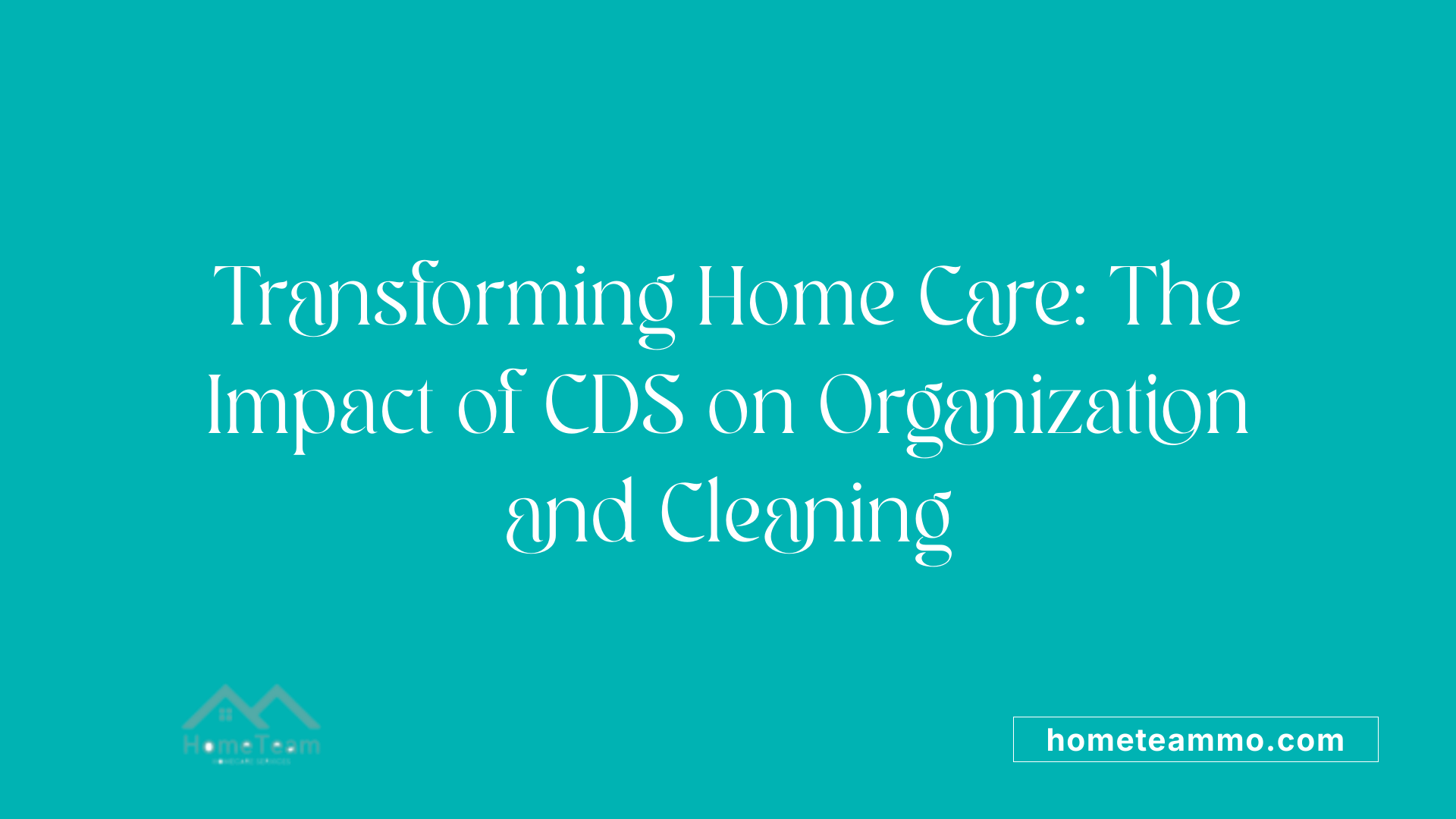 Consumer Directed Services (CDS) significantly influence home care by promoting both independence and efficiency for individuals relying on Medicaid-supported assistance. One of the primary benefits of CDS is its ability to empower members to take control of their care routines, including hiring, scheduling, and supervising their caregivers. This level of involvement helps individuals maintain a sense of autonomy and dignity in managing their personal and household needs.
Consumer Directed Services (CDS) significantly influence home care by promoting both independence and efficiency for individuals relying on Medicaid-supported assistance. One of the primary benefits of CDS is its ability to empower members to take control of their care routines, including hiring, scheduling, and supervising their caregivers. This level of involvement helps individuals maintain a sense of autonomy and dignity in managing their personal and household needs.
Support for independence extends to practical home activities such as housekeeping, laundry, dusting, and trash removal—services included within CDS. By enabling members to choose specific service providers, including family or trusted friends, CDS fosters familiar relationships that can alleviate anxiety and improve comfort. Such familiarity not only enhances the quality of care but also encourages consistent routines that sustain independence.
Furthermore, CDS supports cost-effectiveness by reducing administrative overhead and streamlining service management. Members directly control how services are delivered and compensated, which can lower overall expenses by avoiding unnecessary services and administrative costs. The use of family members or informal caregivers as service providers also minimizes additional expenditures.
In terms of efficiency, CDS programs automate many administrative responsibilities such as payroll, scheduling, and record-keeping through contracted Financial Management Services Agencies (FMSAs). These agencies assist members with budgeting, tax payments, and employment management, freeing up time and reducing the complexity typically associated with caregiving arrangements. The integration of electronic management tools enhances coordination among caregivers, members, and healthcare providers, ensuring timely and personalized care.
Supporting the overall quality of home care, CDS facilitates the development of tailored chronic care plans adaptable to evolving health conditions. This personalized approach helps prevent hospitalizations, manage long-term illnesses effectively, and improve overall well-being. By fostering active participation in care decisions, CDS not only boosts the independence of members but also optimizes the use of healthcare resources, creating a more responsive and sustainable home care environment.
| Aspect | Benefit | Additional Details |
|---|---|---|
| Independence | Increased control over care | Members hire, schedule, and train caregivers, enhancing autonomy |
| Home Management | Better home organization | Includes housekeeping, laundry, and cleaning services |
| Cost-Effectiveness | Lower overall expenses | Reduced administrative costs and use of informal caregivers |
| Service Efficiency | Streamlined processes | Automation of payroll, scheduling, and documentation |
| Care Personalization | Tailored health plans | Adaptable to changing health needs |
| Quality of Life | Enhanced comfort and trust | Familiar caregivers reduce anxiety |
Overall, CDS has a positive impact on the quality of home care by enabling individuals to manage their environments more independently and efficiently, ultimately fostering better health outcomes and sustainable care practices.
Advancing Home Care with Consumer-Directed Support
The role of CDS providers in home organization and cleaning is a cornerstone of personalized, accessible, and effective home health care. By empowering individuals to manage and supervise their caregiving routines, including household tasks, CDS supports greater independence, improves living conditions, and enhances overall quality of life. The integration of advanced software solutions and compliance with safety standards ensures that services are delivered efficiently and safely. As technology advances and regulations evolve, the scope and quality of CDS offerings are expected to expand, promising more innovative and tailored support for home environment management. Embracing these developments will further solidify the vital role of CDS providers in supporting independent living and delivering comprehensive home care.
References
- Consumer Directed Services (CDS) - Superior HealthPlan
- Consumer Directed Services General Information
- Ways CDS Is Transforming Medical Care at Home
- 5200, Consumer Directed Services
- Consumer-Directed Personal Assistance Services: Key Operational ...
- Supporting Family Caregivers in Providing Care - NCBI
- Available DDD Services & Supports
- [PDF] ASHP Guidelines on Compounding Sterile Preparations
- An overview of clinical decision support systems: benefits, risks, and ...
- Change in care dependency and quality of home care nursing ...

How to Plan for Long-Term Home Care Services

How Home Team Helps Families Make Informed Care Decisions

How Home Team's Caregivers Provide Peace of Mind for Families



